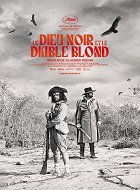Realização:
Glauber RochaArgumento:
Glauber RochaConteúdos(1)
O vaqueiro Manuel e sua esposa Rosa fogem para o sertão depois que ele mata um coronel que tenta enganá-lo. No ermo brasileiro, violento e assolado pela seca, eles encontram duas figuras icônicas: Sebastião, que se diz divino, e Corisco, que se descreve como demoníaco. Amarrar seus destinos com essas figuras é uma decisão trágica, no entanto, pois o mercenário Antonio das Mortes está em seu encalço. (Nitrato Filmes)
(mais)Críticas (3)
The film is lyrical, has a documentary style, is ambiguous, and at the same time absolute in its resistance against the poverty of native Brazil. The distinct poetics of the story, with its mixture of blood, faith, death, and hunger, as well as the lyrical brutality of the narration and its depiction, are the prevailing impressions of the film. However, the second aspect of the film should not be overlooked, which is its realistic testimonial value, through which it transforms from film fiction into a politically engaged work with the ambition to contribute to the change of circumstances. The documentary aspect is not only based on the use of handheld cameras, but also on the faithful portrayal of the history of the Brazilian North - three constitutive elements of the local society: "coronelismo" (according to the latifundists coronéis, the cause of the poverty of small farmers), "beatismo" (according to the beatos-saints, exalted prophets), and "cangaço" (bandits) (more information can be found in The Cinema of Latin America, Wallflower Press, 2003, which has a good and short text about the film). The main character gradually goes through all stages of the real historical process, in which these popular rebels appear against the injustice of poverty and the power that defends it. Once again, it is a positive aspect of Rocha's film in how well he managed to incorporate the contemporary beliefs of these people in God and chiliasm into this struggle. Their faith in a better world, reaching towards the heavens, however, always ends in violence here on Earth (as seen with the bandit Corisco and also with the priest Sebastian), and the entire film is the process of the main character's realization of this fact - that God is not in the heavens, but, together with the devil, is here among us, and the change is up to us.
()
Rocha’s radical folk ballad is still fascinating to this day due to its primitive (in the best sense of the word) form, which, thanks to the fact that it is not bound by standardised norms, can be iconoclastically avant-garde. Unsurprisingly, Black God, White Devil may evoke Alejandro Jodorowsky’s more recent The Mole, compared to which this classic is just a hair less psychedelic and bizarrely deviant in its superficial excess.
()
Brazil is shown here in truly interesting shots and an interesting story that can surprise you with its cruelty and the amount of violence portrayed. However, it is not superficial, but rather a violence that is to some extent analyzed here, which is quite interesting in itself. Still, the film made an impression on me mainly because of the music component, which enhanced the impressions.
()
Galeria (8)
Photo © Capricci Films


Publicidade